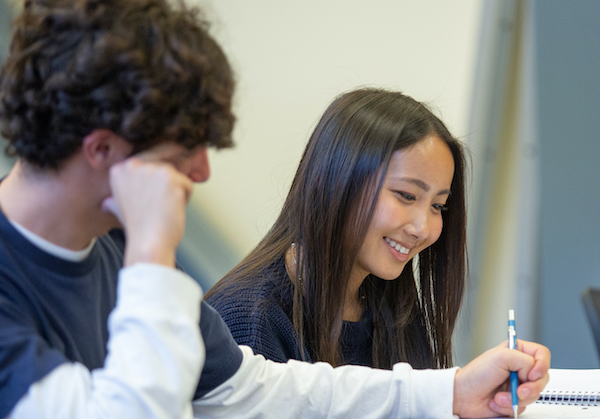Social Studies
 Learning Outcomes
Learning Outcomes
1. Think deeply and critically about social, cultural, political, and economic issues.
Students will be able to analyze, understand, and evaluate social, cultural, political, and economic issues, both historical and contemporary. To make this possible, students will command a substantial knowledge of the world, vertically through time and horizontally across the globe, as well as a familiarity with a wide and diverse range of writings on social questions. They will be capable of working through complex theoretical and practical problems, of interpreting and assessing varying points of view, and of analyzing and understanding causation.
2. Articulate positions on social, cultural, political, and economic issues in a variety of ways.
Students will be capable of voicing their own views on social, cultural, political, and economic issues and of engaging with and respectfully responding to views that challenge their own. Students will be capable of creating thesis-driven, third-person, analytical essays, and research papers. Additionally, students will be able to demonstrate their positions on these issues through the creation of written, visual, oral, or other creative projects.
3. Participate in and contribute meaningfully to a community that explores social, cultural, political, and economic issues.
Students will know the value of being active members of an intellectual community of their peers and will in the future be able to participate in and contribute to communities that explore social, cultural, political, and economic issues. They will have had firsthand experience of grappling with challenging complex material together, of sharing differing opinions and insights, and of gleaning knowledge from the inclusive community of scholars forged in and through a class. They will be as effective at listening as at speaking. They will have experienced authentic collaboration and will more generally appreciate the importance of reciprocity in human relations.
4. Draw connections between the social, cultural, political, and economic issues that they have studied in the classroom and situations that they will encounter in the world outside our school.
Rather than passive receptacles of information, students will become active questioners and investigators of the social, cultural, political, and economic dimensions of the world in which they live. They will understand learning as a part of their everyday lives, carried on outside the classroom as well as in, not as something that occurs only a few periods each day within the same four walls. They will have a greater awareness of, concern for, and engagement with issues relating to social justice.
5. Initiate, organize, and doggedly pursue independent explorations of and interventions in social, cultural, political, and economic issues.
Students will feel empowered to take control of their own lives and to actively pursue their own passions; they will become the kind of people who shape events rather than passively accepting injustice. They will be able to engage with the material in depth over sustained periods of time, and they will seek new solutions when they encounter challenges rather than becoming discouraged by setbacks. They will understand themselves as partners with their teachers and peers, engaged in the same quest for understanding; they will be treated as adults-in-formation and will be given as much intellectual and personal freedom as possible, along with corresponding responsibilities.
Social Studies Curriculum
Grade Nine
ANCIENT AND MEDIEVAL HISTORY
Grade Ten
MODERN HISTORY
Grade Eleven
UNITED STATES HISTORY
ADVANCED STUDIES UNITED STATES HISTORY
SOCIAL STUDIES ELECTIVE COURSES
ADVANCED STUDIES ART HISTORY: ART AND THE OTHER
ADVANCED STUDIES CAMPAIGNS AND ELECTIONS IN THE UNITED STATES
ADVANCED STUDIES DEMOCRACY AND AUTHORITARIANISM
ADVANCED STUDIES GLOBAL ISSUES
AMERICAN WEST CULTURE AND VALUES IN 2OTH CENTURY AMERICA
EDUCATION THEORY
INTRODUCTION TO RACIAL LITERACY
PHILOSOPHY AND SOCIAL ISSUES
THE HISTORY OF SCIENCE, TECHNOLOGY, AND MEDICINE IN THE UNITED STATES
In addition, many high school students elect to enroll in independent studies/special topics to further pursue concepts related to Social Studies. Sample courses include: Film Theory & History, Immigration & Farm Work, Social Philosophy, Structuralism & Post-Structuralism, The Modern Middle East, Proletarian Literature, Existentialism, American Economics Since the 1970s, and much more.